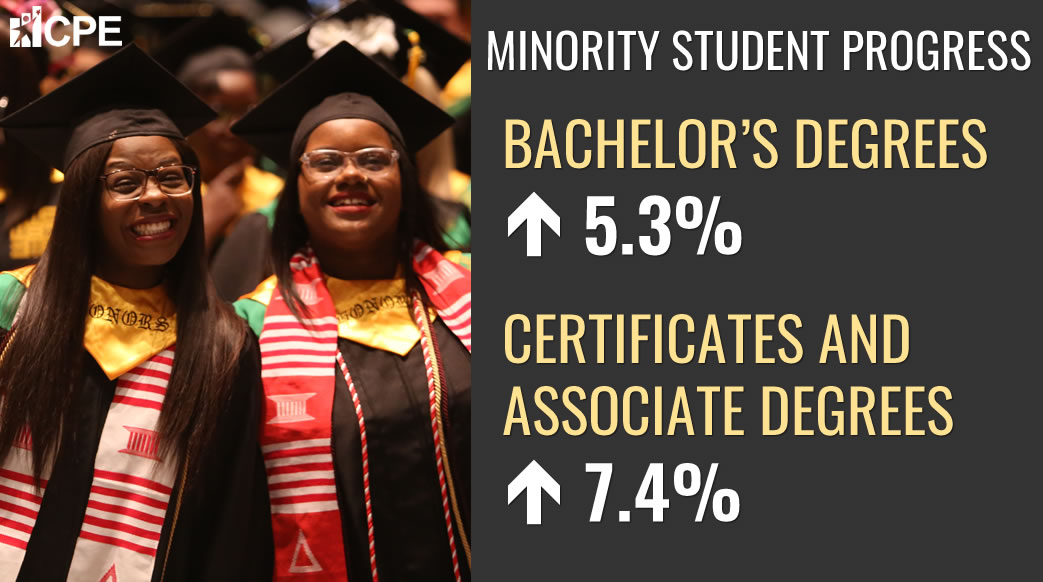CPE's statewide diversity policy driving campuses to narrow achievement gap
May 11, 2020

In a testament to Kentucky's statewide diversity plan for higher education, colleges and universities across the commonwealth made important strides in 2018-19 in closing the achievement gap for underrepresented minority students.
According to the latest progress report from the Kentucky Council on Postsecondary Education (CPE), bachelor's degrees conferred to minority students at public and private institutions increased 5.3% over the previous year. In addition, credentials awarded to minority students at the Kentucky Community and Technical College System (KCTCS) jumped 7.4%.
The report also shows that graduation and retention rates for minority students increased, with some institutions already hitting key performance goals for 2021.
"These gains are essential to creating new opportunities in Kentucky," said CPE President Aaron Thompson. "Companies are clamoring for a more diverse workforce, and our students are eager to demonstrate their talents in the evolving marketplace. I'm encouraged that our forward-looking strategies on equity and inclusion are yielding such positive results."
CPE developed the Kentucky Public Postsecondary Education Policy for Diversity, Equity and Inclusion in 2016. It calls on state universities and KCTCS to improve outcomes in three key areas: recruitment and enrollment of diverse students, student progression and success, and campus climate, inclusiveness and cultural competency.
CPE requires a campus to demonstrate progress in those areas before granting approval for new academic programs. In addition, the state's performance-based funding model incentivizes colleges and universities to focus on closing the achievement gap.
Kentucky campuses are also working to raise overall attainment rates to meet the state's 60x30 goal – an effort to have 60% of working-age adults in Kentucky earn a postsecondary degree or credential by 2030.
Below is a breakdown of some of the biggest gains in attainment, graduation rates and retention for underrepresented minority (URM) students at public institutions in 2018-19, compared to the previous year.
Degrees and Credentials
This metric shows the total number of bachelor's degrees, certificates and associate degrees awarded to URM students.
Associate degrees or less
- KCTCS, up from 4,067 to 4,367
Bachelor's degrees
- Kentucky State University, up from 136 to 157
- Morehead State University, up from 79 to 101
- Northern Kentucky University, up from 237 to 256
- University of Kentucky, up from 661 to 740
- Western Kentucky University, up from 347 to 383
- Total public institutions, up from 2,447 to 2,583
Graduation Rate
This metric shows the percentage of first-time, full-time URM students entering in the fall semester who graduate with an associate degree or credential within three years at KCTCS or with a bachelor's degree within six years at a public university.
- KCTCS, up from 22.1% to 22.7%
- Kentucky State University, up from 14.5% to 24.2%.
- Morehead State University, up from 37.9% to 43.4%
- Northern Kentucky University, up from 34.8% to 38%
- University of Kentucky, up from 54.2% to 56%
- Western Kentucky University, up from 33.6% to 34.7%
- Total public universities, up from 42.7% to 43.4%
Retention Rate
This metric shows the percentage of first-time, degree- or credential-seeking URM students enrolled in the previous summer or fall who are still enrolled the following fall or, in the case of KCTCS students, have successfully completed a credential.
- KCTCS, up from 45.4% to 49.5%
- Kentucky State University, up from 56.8% to 67%
- Northern Kentucky University, up from 63.1% to 69.1%
- University of Kentucky, up from 77.5% to 78.5%
- Western Kentucky University up from 57.1% to 59.5%
- Total public institutions, up from 70.7% to 71.5%
Last Updated: 7/23/2021
